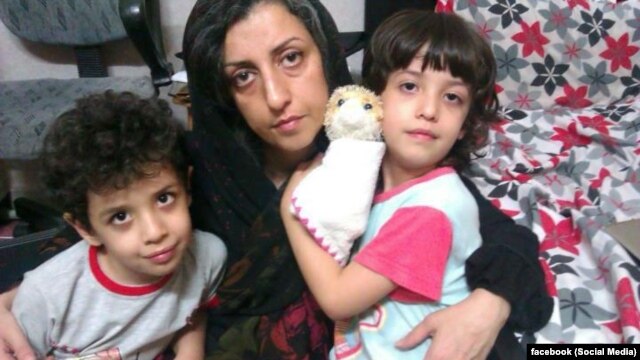Leading Iranian human rights defender sentenced to 16 years in prison
| Publisher | Radio Free Europe/Radio Liberty |
| Publication Date | 19 May 2016 |
| Cite as | Radio Free Europe/Radio Liberty, Leading Iranian human rights defender sentenced to 16 years in prison, 19 May 2016, available at: https://www.refworld.org/docid/5769013013.html [accessed 30 May 2023] |
| Disclaimer | This is not a UNHCR publication. UNHCR is not responsible for, nor does it necessarily endorse, its content. Any views expressed are solely those of the author or publisher and do not necessarily reflect those of UNHCR, the United Nations or its Member States. |
Last updated (GMT/UTC): 19.05.2016 19:30
By Golnaz Esfandiari
 Iranian human rights activist, Narges Mohammadi with her children Ali (center) and Kiana
Iranian human rights activist, Narges Mohammadi with her children Ali (center) and Kiana
A leading Iranian human rights activist has been sentenced to a total of 16 years in prison after being convicted of charges that include membership in a campaign for the abolition of the death penalty.
The heavy sentence against Narges Mohammadi, the deputy head of the Defenders of Human Rights Center (DHRC) co-founded by Iranian Nobel Peace Prize laureate Shirin Ebadi, was issued on top of a six-year-prison sentence she is already serving.
"It's revenge [against] a human rights defender to keep her in prison and intimidate other rights activists," Mohammadi's husband, Taghi Rahmani, told RFE/RL's Radio Farda.
Rahmani, who is based in Paris with their two children, said that 10 years of the 16-year prison sentence was issued for "establishing" the outlawed campaign called Step By Step To Stop The Death Penalty in Iran.
But he said Mohammadi was merely a member of the campaign, not a founder.
"She's not one of the founding members of the campaign," Rahmani said in a May 19 telephone interview.
"Why is working to decrease the high number of executions in Iran a crime?" Rahmani asked.
He said Mohammadi was sentenced to five years in prison for "meeting and conspiring against the Islamic republic," and one year for "acting against Iran's national security."
Rahmani said the charges stem from Mohammadi's interviews with Persian-language media based outside of Iran and also for a 2014 meeting in Tehran with former EU foreign policy chief Catherine Ashton.
Under Iranian laws, a person sentenced to multiple prison sentences will serve only the most severe, which means that in practice Mohammadi has been sentenced to 10 years' imprisonment.
The sentence can be appealed.
The French media watchdog Reporters Without Borders (RSF) condemned the sentence as the outcome of "a flawed trial" held on April 20 under the influence of Iran's intelligence ministry and the Islamic Revolutionary Guards Corps (IRGC).
"Such a heavy sentence shows the iniquitous character of Iranian justice," the group's secretary-general, Christophe Deloire, said in a May 19 statement.
He added: "President [Hassan] Rohani cannot remain silent in the face of such a judicial outrage even if everyone knows the judicial system takes its orders from the supreme leader."
Amnesty International said the "shocking" prison sentence against Mohammadi was "an all-out attack on human rights defenders in Iran."
"The authorities have made clear their ruthless determination to silence human rights defenders and instill fear in would-be critics of their policies," Philip Luther, director of the Middle East and North Africa program at Amnesty International, said in a statement.
Luther said it is shameful for the Iranian authorities to treat a prominent human rights defender as a criminal.
"It exposes their lip service to human rights as utterly meaningless and shows their deep disdain for the basic principles of justice," he said.
Mohammadi, who has been honored by RSF as an information hero for her defense of human rights, was arrested in May 2015.
She had been detained before and sentenced to prison over her human rights activities on several other occasions.
Radio Farda broadcaster Roya Karimimajd contributed to this report
Link to original story on RFE/RL website
